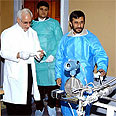
Ahmadinejad: We don't give a damn
Iranian president says country to pay no attention to international calls to halt its nuclear work, doesn't 'give a damn' about U.N. resolutions. Psychological warfare, embargos won't stop Tehran's nuclear program, president states
Iran's president said on Friday his country would pay no attention to international calls to halt its nuclear work, hours before the U.N. Atomic watchdog reports on whether Tehran has met U.N. Security Council demands.
"Those who want to prevent Iranians from obtaining their right, should know that we do not give a damn to such resolutions," Mahmoud Ahmadinejad told a rally in northwest Iran, the official IRNA news agency reported.
"Enemies think that by ... threatening us, launching psychological warfare or ... Imposing embargos can dissuade our nation to obtain nuclear technology," Ahmadinejad said in Zanjan province.
U.N. envoy: Nuclear program peaceful
Earlier, Iran's U.N. Ambassador said Iran will not comply with any Security Council resolution aimed at halting its nuclear enrichment program because its activities are legal and peaceful, and pose no threat to international security.
Ambassador Javad Zarif said he expects "a lot of pressure from the United States to impose another short-sighted decision on the Security Council" after Friday's release of a report by U.N. Nuclear chief Mohamed ElBaradei. ElBaradei, the director-general of the International Atomic Energy Agency, is expected to report that Iran has refused to suspend all uranium enrichment, which can be used to generate electricity but also in nuclear weapons.
In anticipation of the report, U.S. Ambassador John Bolton has already said he plans to introduce a resolution requiring Tehran to comply with the council's demands. The resolution would not call for sanctions now, but would be introduced under Chapter VII of the U.N. Charter which allows for sanctions at a later point and is militarily enforceable.
Asked how Iran would respond to such a resolution, Zarif replied: "Well if the Security Council decides to take decisions that are not within its competence, then Iran does not feel obliged to obey."
He maintained that the Security Council is not competent to deal with Iran's nuclear enrichment program "because it has been stated again and again by everybody who's familiar with this issue that this is not a threat, not imminent ... That Iran's program has shown no indication of being anything but peaceful," the Iranian ambassador said Thursday.
"Therefore the proper context for the discussion of this issue is within the IAEA," he said. "It is not within the competence of the Security Council to deal with this issue and the Security Council will be simply eroding its authority by adopting any decision that does not fall within its competence."
U.S. pushing for U.N. action
The United States has long pushed for the Security Council take responsibility for the Iranian nuclear issue but Russia and China, both veto-wielding council members, oppose sanctions and back Iran in wanting the IAEA to remain in the lead.
Bolton said if a Chapter VII resolution is adopted, the council "would be determining that there's a threat to international peace and security" And its provisions would be legally binding.
But whether the deeply divided council will agree remains in question.
In recent days as the release of ElBaradei's report has approached, U.S. And Iranian officials have been trading accusations.
Iran's hard-line President Mahmoud Ahmadinejad vowed Thursday that "no one" Could make Iran give up its nuclear technology. Earlier in the week Iran offered to transfer nuclear technology to other countries, including conflict-wracked Sudan.
Meanwhile, Russian Foreign Minister Sergey Lavrov said the report expected to be submitted by the U.N. nuclear watchdog chief will help the international community adopt a joint stance on the Iranian nuclear crisis.
AFP contributed to the report










